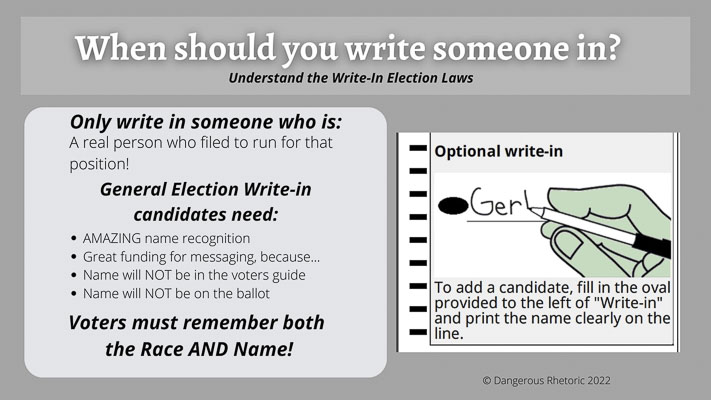
In her weekly column, Nancy Churchill offers advice and understanding about the law for write-in candidates in Washington state
Nancy Churchill
Dangerous Rhetoric
The Washington state elections process is unique and hard to understand. Our election laws seem to be designed to make it easy to cheat, hard to catch the cheating, and hard to challenge elections. This election’s integrity issue isn’t new… it’s been going on for many years. Mandatory mail-in voting, voter registration by the Department of Licensing and same day voter registration are just a few of the flaws in our elections laws. Our jungle primary system is also a huge problem. In the jungle primary, only the top two vote getters go on to the general election, even if they’re both of the same party. Flooding the ballot with Republican candidates often splits the vote and prevents any Republican candidate from making it to the general. On our November ballots, we’ll often have to make a choice between two candidates we don’t like. Or we’ll have only one candidate, because no one challenged. Now what do Republican or conservative voters do? Understand the write-in law

I recently heard a candidate for state office say, “If you don’t like the candidates on your ballot, just write someone in…” Unfortunately, this is really bad advice indicating a lack of understanding about the law for write-in candidates in Washington state. Most of the time, a write-in vote is a wasted vote. Only the election workers will see it, and they don’t care if some random voter doesn’t understand the law. You have thrown away your vote and you have also opened up your ballot for possible “mishandling.”
There’s only one time when a write-in is a “real” vote. Let’s look at the law to figure out that limited circumstance.
When does a write-in work?
Before writing in a candidate, understand the law. The section of the law that governs write-in candidates is RCW: 29A.24.311. The secretary of state has a good summary of the rules for write-in candidates.
First, for the general election in November, a write-in candidate may not be a person who was on the primary ballot and lost. It must be a new candidate for that position. For example, in the 4th Congressional District, none of Dan Newhouse’s primary challengers can be legally written in on the November ballot, because they already lost in the primary.
Next, the write-in candidate must personally file to run as a write-in for that position, and pay the necessary fees. This means a real person made a real decision, and put their chips on the table. A vote for anyone who didn’t file for the position means that you have thrown away your vote! Don’t fall into this trap! Only vote for a real person who has filed to run in the race!
Third, the general election write-in candidate will NOT appear in the voters pamphlet, nor will he or she be on the ballot. This is the price the last-minute candidate pays for not jumping into the primary race. This problem is why most write-in campaigns fail. Why wasn’t the candidate organized enough or knowledgeable enough to file during filing week or run in the primary?
To overcome the fact that the write-in candidate’s name is NOT going to be on the ballot, the write-in must have AMAZING jurisdiction-wide name recognition, AND a very, very well-funded campaign. Voters must remember both their name and the race, and then write it in — a very high bar.
If the candidate isn’t well known, isn’t organized enough to file in a timely manner, and isn’t well-funded, their campaign is most likely (but not necessarily) going to lose. It takes strong organizational skills and good funding to win a write-in race.
The bigger the jurisdiction, the harder the write-in campaign becomes. A statewide race or congressional district race are very long shots indeed.
Finally, something you’ll be aware of if you’ve observed elections in Washington: Any ballot that has a write-in on it must be handled separately by the election workers. They have to determine if there’s a legal write-in for that race, and then they make their “best guess” as to who you intended to vote for in that race. I’ve observed a lot of elections in Ferry County and I trust my election workers. Our team is top notch! But voters who don’t have the privilege of living in Ferry County might not be as confident that ballots requiring “special processing” will be counted correctly, especially in Washington’s larger metropolitan areas.
Voters in other parts of the state might want to think twice before doing something that would cause their entire ballot to require special handling, since it adds another layer of uncertainty in a state elections system that already has troubling allegations of fraudulent counting. Most of the time, I don’t want to do anything to my ballot to require special processing or handling.
These problems I outlined are true for EVERY write-in campaign, regardless of the position.
A special case
A candidate who was a write-in for the primary election and received at least 1% of the turnout WILL appear on the general election ballot. That’s good news for the candidate because voters will see his or her name on the ballot, but it’s still an uphill climb since the candidate’s statement will not appear in the voter’s pamphlet. Such candidates will still need to run a strong campaign to reach the voters.
Don’t throw your vote away!
If you are in doubt, you can find the eligible candidates for this November’s election at the VoteWa General Election 2022 page. Use the county drop down menu to choose your county. When you vote for “Mickey Mouse” you have disenfranchised yourself! Do your research this year, and only vote for a valid, registered candidate, whether traditional or write-in. If you have questions, contact your local Republican party or your auditor’s office for help.
Nancy Churchill is the state committeewoman for the Ferry County Republican Party. She may be reached at DangerousRhetoric@pm.me. The opinions expressed in Dangerous Rhetoric are her own.
Also read:
- Opinion: OIC tells consumers not to pay for ‘insurance’ you won’t likely benefit from: Does that include WA Cares?Elizabeth New (Hovde) of the Washington Policy Center believes you should consider yourself warned by the Office of the Insurance Commissioner about WA Cares and its maybe-only benefit.
- Opinion: Same road, different speed limit?Target Zero Manager Doug Dahl addresses a question about speed limit signs going into and leaving town.
- Opinion: Hiding the growing cost of the Interstate Bridge replacementJoe Cortright of the City Observatory addresses the rising cost of the Interstate 5 Bridge replacement project.
- Letter: ‘This election I am NOT voting for Greg Cheney’Clark County resident Wynn Grcich shares her thoughts on Rep. Greg Cheney and the issue of fluoridation in area drinking water.
- POLL: Should biological males who identify as females be allowed to compete in athletic events against biological females?Should biological males who identify as females be allowed to compete in athletic events against biological females?










